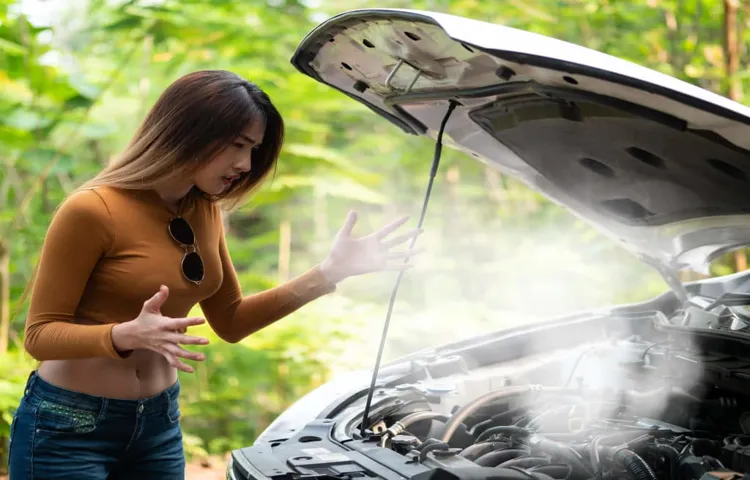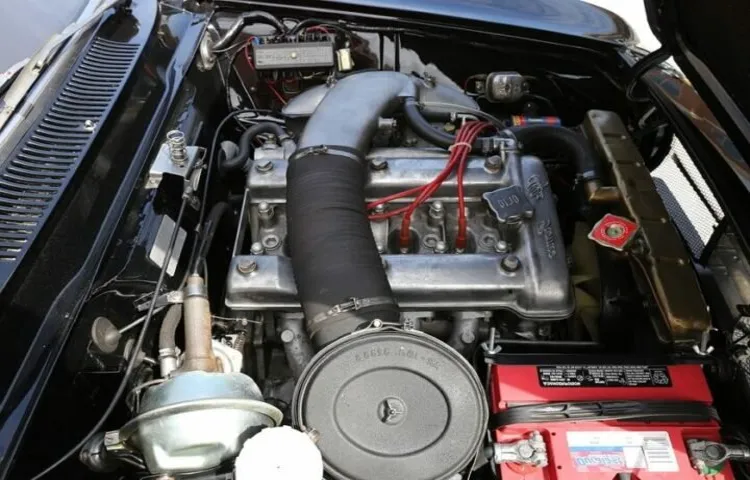Have you ever experienced the frustration of your car overheating, despite having enough coolant? It’s a perplexing situation that may leave you scratching your head and wondering what could be the cause. After all, coolant is designed to regulate the temperature of your engine and prevent it from overheating, so why isn’t it doing its job? Well, in this blog post, we’re here to uncover the answers and shed light on why your car might be overheating despite having coolant. We’ll explore the various possible reasons, such as a malfunctioning thermostat, a faulty radiator, or even a clogged cooling system.
By the end of this post, you’ll have a better understanding of what might be causing your car’s overheating issue and how to address it effectively. So, let’s dive in and unravel the mystery behind overheating with coolant!
Table of Contents
Introduction
Why is my car overheating with coolant? It can be frustrating when your car overheats despite having enough coolant in the system. There could be several reasons for this issue. One possibility is that there is a problem with the thermostat.
The thermostat is responsible for regulating the flow of coolant through the engine. If it gets stuck closed, the coolant won’t circulate properly and can cause the engine to overheat. Another possibility is that there is a blockage in the cooling system.
This could be due to a buildup of debris or sediment that restricts the flow of coolant. Additionally, a faulty water pump can also cause overheating. The water pump is responsible for circulating the coolant throughout the engine, and if it fails, the coolant won’t be able to reach the engine effectively.
It’s also worth checking if there are any leaks in the cooling system. Even small leaks can cause a loss of coolant and lead to overheating. In any case, it’s important to have your car inspected by a qualified mechanic to diagnose and fix the issue.
Explanation of cooling system
cooling system Introduction: When it comes to keeping our vehicles running smoothly, one crucial component that often goes unnoticed is the cooling system. This system plays a vital role in preventing our engines from overheating and causing severe damage. But how does it work? In this blog post, we will dive into the details of the cooling system and explore why it is essential for the overall health of our vehicles.
So grab a seat and let’s explore this fascinating system together!

Possible causes of overheating
overheating, possible causes Introduction: Overheating can be a frustrating problem that affects various electronic devices, such as computers, smartphones, and even cars. It occurs when the temperature of the device rises abnormally high, resulting in performance issues and, in some cases, damage to the internal components. Understanding the possible causes of overheating is essential in order to prevent it and ensure the longevity of our devices.
In this article, we will explore some common reasons why devices overheat and practical solutions to mitigate this problem.
Insufficient coolant
Have you ever wondered why your car is overheating, even though you have enough coolant in the system? Well, it could be due to insufficient coolant flow. When the coolant is not circulating properly, it cannot effectively absorb and dissipate heat from the engine. This can result in the engine temperature rising beyond normal levels and causing the car to overheat.
There are several reasons why there might not be enough coolant flow. One possibility is a clogged radiator or heater core, which can block the flow of coolant. Another reason could be a malfunctioning thermostat that is not opening and closing properly.
Additionally, a damaged water pump or a leak in the coolant system could also result in insufficient coolant flow. It’s important to address these issues promptly to prevent further damage to your engine. So, if you find that your car is overheating despite having enough coolant, it’s worth investigating the coolant flow to identify and resolve any issues.
Low coolant level
“Insufficient coolant can be an unexpected headache for car owners. It’s no secret that coolant plays a crucial role in keeping your engine running smoothly and preventing it from overheating. So when you notice your coolant level is low, it can leave you wondering what went wrong and how to fix it.
Well, fear not! We’re here to shed some light on this all too common issue. There are several reasons why your coolant level may be low. One possibility is that there is a leak in your cooling system.
Over time, hoses and connections can wear out or become loose, causing coolant to slowly leak out. Another reason could be a faulty radiator cap, which is designed to maintain the pressure in the cooling system. If the cap is not working properly, coolant can escape, leading to a low level.
Additionally, your coolant level may also decrease if you have a blown head gasket. This is a more serious issue that requires immediate attention, as it can lead to further engine damage if not addressed promptly. If you suspect that your coolant level is low, it’s important to take action.
Ignoring the issue can result in overheating and potentially costly damage to your engine. The first step is to locate your coolant reservoir, which is typically a transparent plastic container near the radiator. Check the level of coolant inside the reservoir and compare it to the “full” and “low” marks.
If the level is below the “low” mark, it’s time to add more coolant. When it comes to adding coolant, it’s crucial to use the right type and mixture. Different vehicles require different coolant formulations, so it’s best to consult your owner’s manual or ask a professional for guidance.
Faulty thermostat
faulty thermostat, insufficient coolant, car engine, overheating, radiator, temperature control, malfunction, coolant levels, maintenance, cooling system. Have you ever wondered why your car’s engine overheats even when you’ve just had it serviced? One possible culprit could be a faulty thermostat. This small but vital component is responsible for regulating the flow of coolant through your engine and radiator.
If the thermostat malfunctions, it can cause your engine to overheat by either restricting the flow of coolant or not allowing it to circulate at all. This leads to an insufficient coolant supply, which means that the engine is not being properly cooled down, leading to overheating. So, it’s crucial to check your thermostat regularly and ensure it is in good working order.
If not, it’s time to get it replaced to prevent any further damage to your engine. Remember, your car’s cooling system plays a crucial role in keeping your engine temperature under control, so regular maintenance is essential to avoid any costly repairs down the road.
Blocked radiator
blocked radiator, insufficient coolant
Coolant system leaks
“Why is my car overheating with coolant?” This is a common question that many car owners have experienced at some point. One possible reason for this issue could be coolant system leaks. Coolant, also known as antifreeze, is responsible for regulating the temperature of the engine.
It circulates through the coolant system, absorbing heat and preventing the engine from overheating. However, if there is a leak in the system, it can cause the coolant to escape and reduce its effectiveness. As a result, the engine may start to overheat.
Coolant system leaks can occur due to various reasons, such as a damaged hose, a faulty radiator, or a cracked cylinder head. It is essential to address these leaks promptly to prevent further damage to the engine and ensure optimal cooling performance. Regular maintenance and inspections by a professional mechanic can help identify and fix coolant system leaks before they cause serious issues.
So, if you notice that your car is overheating despite having enough coolant, it’s crucial to check for leaks and get them repaired as soon as possible.
Damaged hoses
Damaged hoses in a vehicle’s coolant system can be a major headache for car owners. These leaks can cause a loss of coolant, leading to overheating and potential damage to the engine. So, what exactly causes these hoses to become damaged? Well, there are a few factors at play here.
Over time, hoses can degrade and become weakened due to exposure to heat and chemicals in the coolant. Additionally, constant pressure and movement can also contribute to the wear and tear on the hoses. Think of it like a garden hose that has been left out in the sun for too long – eventually, it starts to crack and leak.
Similarly, the hoses in your car’s coolant system can suffer the same fate. So, it’s important to regularly inspect these hoses for any signs of damage. Look for bulges, cracks, or leaks – these are all red flags that indicate it’s time for a replacement.
By catching these issues early on, you can avoid more serious problems down the line and keep your car running smoothly. So, the next time you’re under the hood of your car, take a moment to check those hoses and ensure they’re in good shape. Trust me, your vehicle will thank you!
Cracked radiator
coolant system leaks, cracked radiator
Malfunctioning water pump
malfunctioning water pump, coolant system leaks
Other possible reasons
If you’ve checked your coolant levels and they’re just fine, but your car is still overheating, there could be several other reasons why this is happening. One possible reason could be a malfunctioning thermostat. The thermostat is responsible for regulating the flow of coolant in your car’s cooling system.
If it’s not working properly, it may not be opening and closing as it should, leading to overheating. Another possible reason could be a blocked radiator. The radiator is responsible for cooling the coolant before it goes back into the engine.
If it’s blocked by debris or dirt, it won’t be able to do its job effectively, causing the engine to overheat. Additionally, a faulty water pump could also be the culprit. The water pump is responsible for circulating the coolant throughout the engine.
If it’s not working properly, the coolant won’t be able to flow as it should, resulting in overheating. Lastly, a broken cooling fan could also be a reason for the overheating. The cooling fan helps to regulate the temperature of the engine by blowing air over the radiator.
If it’s not functioning properly, the engine may not be able to cool down, leading to overheating. It’s important to have these issues checked and resolved by a professional mechanic so that further damage to your engine can be prevented.
Electric cooling fan failure
electric cooling fan failure
Faulty temperature sensor
faulty temperature sensor, temperature inaccuracies, malfunctioning sensors, correct temperature readings, temperature control system. Other possible reasons for temperature inaccuracies in a temperature control system can include faulty wiring, power surges, or software glitches. If the temperature sensor itself is not the issue, it is important to check all of the connections and wiring to ensure that there are no loose or damaged wires that could be causing errors in temperature readings.
Power surges can also affect the accuracy of temperature sensors, so it is important to protect the system with surge protectors or voltage regulators. In addition, software glitches or bugs can cause the temperature control system to display incorrect readings. Regular system updates and maintenance can help to identify and resolve these software issues.
By addressing these other possible reasons for temperature inaccuracies, you can ensure that your temperature control system is providing accurate and reliable temperature readings.
Malfunctioning pressure cap
In addition to a malfunctioning pressure cap, there are other possible reasons why a car’s radiator may not hold pressure. One common culprit is a faulty radiator cap. The radiator cap is designed to maintain the proper pressure in the cooling system, but if it becomes worn or damaged, it may not be able to do its job effectively.
Another potential issue could be a leak in the radiator hoses. Over time, the hoses can wear out or develop cracks, causing coolant to leak and the pressure to drop. Additionally, the radiator itself may be damaged.
If the radiator is leaking or has any other kind of damage, it may not be able to hold pressure properly. It’s also worth checking the water pump, as a malfunctioning pump can disrupt the proper flow of coolant and cause pressure issues. Overall, a malfunctioning pressure cap is just one of many possible reasons why a car’s radiator may not hold pressure, so it’s important to inspect all components of the cooling system to determine the cause of the problem.
Conclusion
Well, it seems like your car has decided to channel its inner lava-spewing volcano. Yes, that’s right, it’s gone all “Hot Wheels” on you! But fear not, it’s not because your car has some secret pyrotechnic ambitions; it’s simply dealing with an overheating issue. Now, you may be wondering why, oh why, is this happening when you’ve diligently filled your coolant reservoir to the brim? You see, even though your coolant is as chill as an ice cream sundae on a winter’s day, there can still be a sneaky culprit lurking beneath the surface.
One possibility is a faulty radiator. Think of it as your car’s very own personal air conditioner. If it’s not doing its job correctly, the coolant won’t get properly cooled down, leaving your engine hotter than a salsa dance floor.
Another potential thorn in your car’s side could be a clogged radiator. It’s like when you try to sip a refreshing beverage through a straw that’s been used to slurp up a delicious milkshake – not the easiest task, right? But wait, there’s more! The thermostat, that small but mighty guardian of temperature regulation, might be causing a ruckus. If it gets stuck in the closed position, it’s like trapping your engine in a sauna with no way out.
And nobody wants their poor engine to feel like a sweaty mess. Now, you might be thinking, “But can’t my car handle the heat? I mean, it’s cool as a cucumber most of the time!” Well, dear driver, even the coolest of cars can sometimes succumb to the overwhelming heat of the road. It’s essential to keep a vigilant eye on your engine’s temperature gauge and not let it overheat for too long, or else your car might just throw a tantrum in the form of engine damage.
So, my wise friend, the next time your car decides to turn up the heat when it’s least expected, remember to give it a thorough check-up. Check that radiator, give the thermostat a little shake, and ensure that your coolant is flowing smoothly. And if everything checks out but you’re still scratching your head, maybe it’s time to call in the car whisperers – the mechanics – to help decipher your car’s secret overheating code.
“
FAQs
Why is my car overheating even though I have coolant?
There can be several reasons why your car is overheating despite having coolant. Some possible causes include a malfunctioning radiator, a faulty thermostat, a coolant leak, or a blocked radiator hose. It is important to have your car inspected by a professional mechanic to determine the exact cause and address the issue promptly.
How can I tell if my car’s coolant level is low?
Checking the coolant level in your car is relatively easy. Start by locating the coolant reservoir, usually a transparent plastic tank with min/max level markings. Ensure that the engine is cool before opening the reservoir cap. If the coolant level is below the minimum mark, you need to add more coolant. It is important to use the recommended coolant type specified by your car’s manufacturer.
What should I do if my car is overheating while driving?
If your car starts to overheat while driving, it is crucial to take immediate action to prevent further damage. Begin by turning off the air conditioning and turning on the heater to help dissipate heat from the engine. Pull over to a safe location as soon as possible and turn off the engine. Do not attempt to open the radiator cap while the engine is hot. Contact a roadside assistance service or a mechanic for further guidance.
Can using the wrong type of coolant cause my car to overheat?
Yes, using the wrong type of coolant can potentially cause your car to overheat. Different vehicles require different types of coolant, such as ethylene glycol-based or propylene glycol-based. Using the wrong coolant can result in inadequate heat transfer, leading to engine overheating. Always refer to your car’s manual or consult with a professional mechanic to ensure you are using the correct type of coolant.
What are the symptoms of a coolant leak?
Coolant leaks can manifest in various ways and may indicate a potential problem with your car’s cooling system. Some common symptoms of a coolant leak include a sweet smell inside the vehicle, visible coolant puddles underneath the car, an overheating engine, engine misfires, or white exhaust smoke. If you notice any of these signs, it is crucial to have your vehicle inspected by a mechanic to prevent further damage.
How often should I check my car’s coolant level?
It is recommended to check your car’s coolant level at least once a month, especially in hot weather conditions or before embarking on long trips. Regularly monitoring the coolant level ensures that your car’s cooling system is functioning properly and helps prevent potential overheating issues.
Can a faulty thermostat cause overheating even with sufficient coolant?
Yes, a faulty thermostat can indeed cause overheating even if your car has sufficient coolant. The thermostat is responsible for regulating the flow of coolant through the engine. If it becomes stuck in the closed position, it can prevent coolant from circulating properly, leading to overheating. A malfunctioning thermostat should be replaced promptly to avoid potential engine damage.



